Ours is a holistic approach that does not hinder the physiological processes of the body. It's an approach that encourages the restoration of balance, by combatting the causes of symptoms as efficiently as possible and ensuring fast relief.
Symptoms and relief
SELECT YOUR NEED
Intestine
THE INTESTINAL MUCOSA
In addition to other critical physiological functions such as digestion, immune regulation and interaction with the microbiota, the intestinal mucosa performs a specific selective absorption role: it selects useful nutrients and discards waste that could harm the body, acting as a molecular filter.
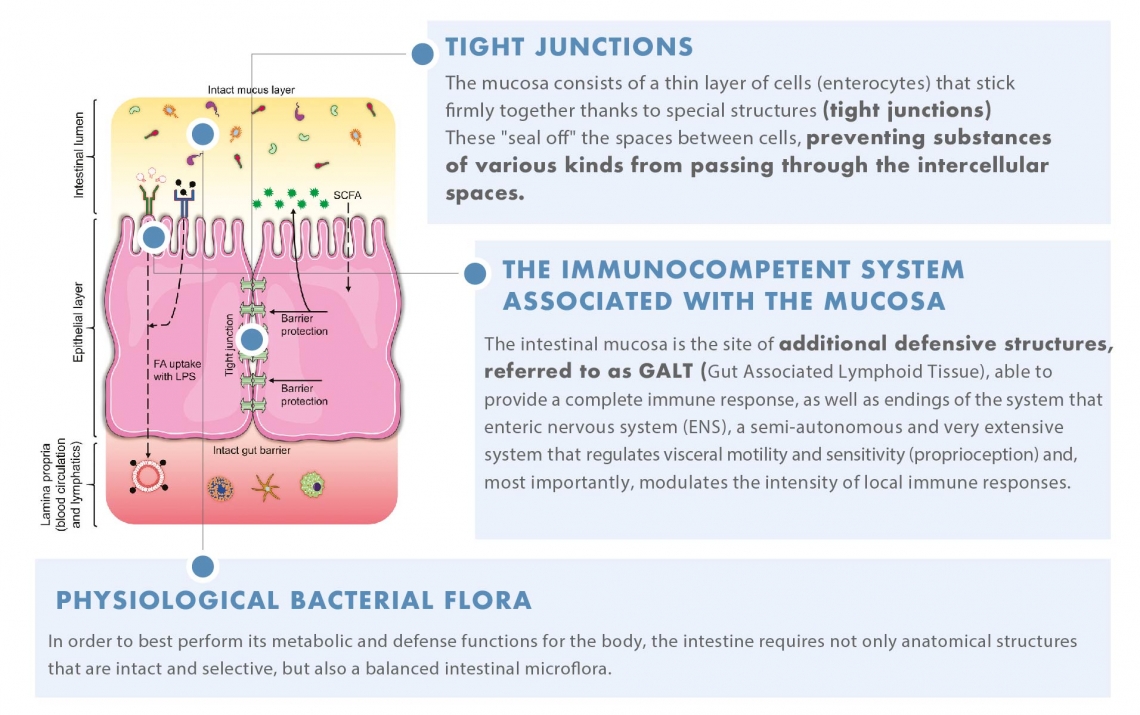
ALTERATIONS OF THESE STRUCTURES AND THE INTEGRITY OF THE MUCOSA
LEAKY GUT SYNDROME
Leaky Gut Syndrome is a condition of altered intestinal permeability in which the body has to respond to a massive quantity of antigens, forcing the excretory organs to be overworked in performing their function of disposal and detoxification.
The functional integrity of the mucosa can fail due to multiple factors, mainly related to diet and lifestyle, which can, over time, lead to the loosening of the filtration structure, allowing the passage of insufficiently-digested food particles, toxins and pathogens.
As a result, substances that should have been eliminated reach the blood circulatory system, triggering generalized inflammation.
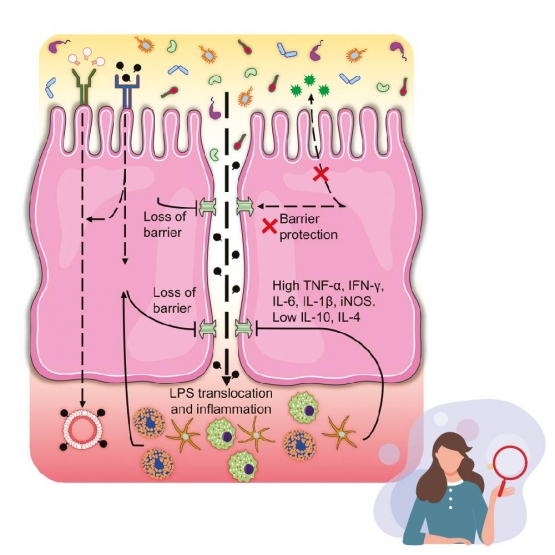
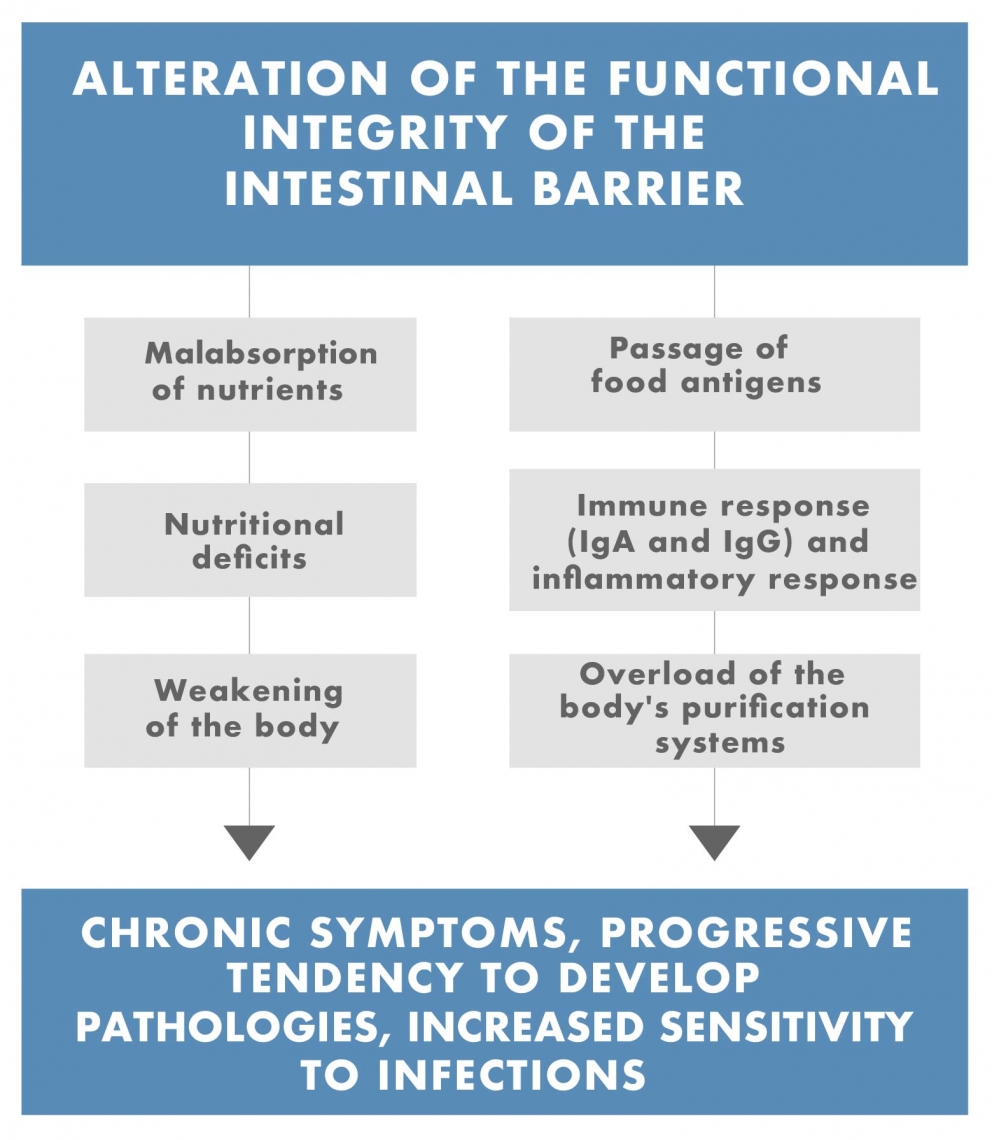
CHRONIC INFLAMMATORY BOWEL DISEASES
Chronic inflammatory bowel diseases (also known as Inflammatory Bowel Disease, “IBD“) include Crohn's disease, microscopic colitis and ulcerative rectocolitis.
Today, an estimated 200,000 people in Italy suffer from these disorders.


IBDs:
- affect men and women with equal frequency
- are "idiopathic" diseases, i.e., of unknown cause
- involve a long list of extra-intestinal manifestations
GSE - GRAPEFRUIT SEED EXTRACT
- NATURAL SELECTIVE ANTIMICROBIAL ACTION Aimed at eliminating only the pathogenic microorganisms responsible for dysbiosis..
- CYTOPROTECTIVE AND CYTOREPAIRING ACTION Stimulates the synthesis of substances, physiologically present in the body, which are functional in protecting the gastrointestinal mucosa and repairing it if it is injured
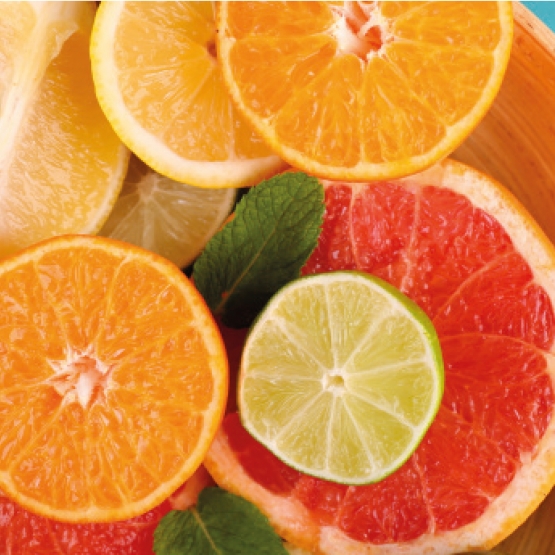
Hericium Erinaceus
Hericium erinaceus is a MEDICINAL MUSHROOM used in Traditional Chinese Medicine for inflammatory and functional disorders of the entire gastrointestinal tract.
The anti-inflammatory, immunomodulatory, and protective colon mucosal action of Hericium polysaccharides has also gained important experimental evidence in the West. Clinical research also attributes it with neuroprotective, nootropic properties and aiding symptoms of anxiety and depression, often the origin of many forms of IBS. The whole phytocomplex promotes numerous other useful actions in subjects with intestinal diseases (gastroprotection, anti H. pylori, hepatoprotection, improvement of metabolic parameters, anti-fatigue, etc.).
Perilla Frutescens
Extracts of Perilla frutescens leaves showed clinical efficacy for symptoms of intestinal discomfort, with significant improvement in all parameters analyzed. The results were even more apparent in the female gender subgroup, an element that adds value to the study since women are statistically much more prone to this type of discomfort than men.
The leaves of this aromatic plant have antioxidant, antispasmodic and anti-inflammatory properties.
Peppermint essential oil
Peppermint essential oil (MPOE) has pain-relieving action and also aids the spasmolytic activity of intestinal smooth muscle, which is indispensable in both localized inflammation (acute or chronic) and dysfunctional motility syndromes due to the presence of menthol.
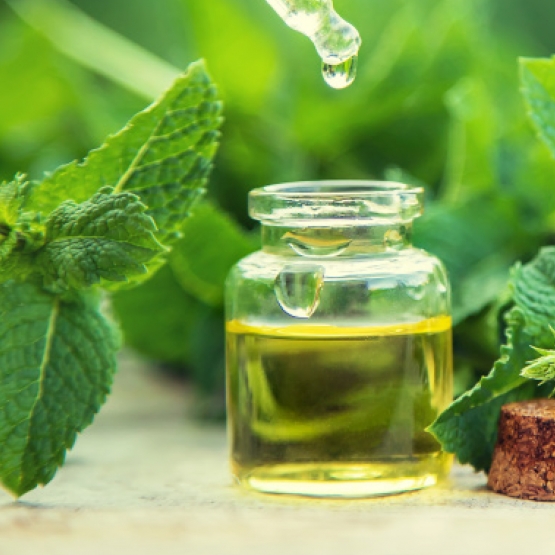
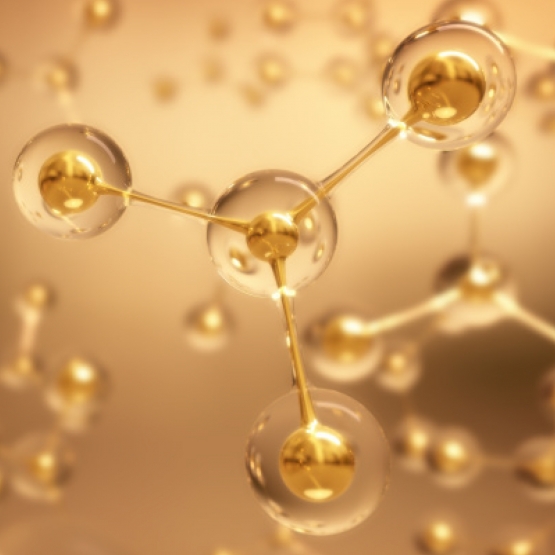
Vitamins B1 and B6
Vitamins B1 and B6, which are systematically deficient in individuals with inflammatory bowel disease, are essential for the proper functioning of the entire intestinal ecosystem and, by extension, the entire body.
Aloe Vera Gel
It is known to have numerous beneficial effects on the intestines, most notably anti-inflammatory, prebiotic, and antioxidant. It also promotes the absorption and bioavailability of vitamins.
Bilberry, Alchemilla, Baobab, Agrimony, Carob
ANTI-INFLAMMATORY AND MUCOSAL REBALANCING ACTION
Five plants specifically selected for their anti-inflammatory and antioxidant action, helpful in relieving the intestinal mucosa affected by the condition, and neutralizing free radicals responsible for damaging tissues.
LIFESTYLE - NUTRITION INTESTINE
Unbalanced and unconscious food choices are key to the onset of intestinal problems. First, dietary excesses force the intestines and the organs responsible for digestion (the pancreas, liver, gallbladder) to become overworked, especially when the foods introduced are devoid of the substances necessary for their metabolization, such as enzymes. One can assume that diets in the Western world are poorly balanced and very often produce effects that destabilize the delicate balance of the intestinal ecosystem. The main causes are insufficient fiber consumption and the excessive consumption of sugars, animal proteins and hydrogenated fats. Excessive consumption of sweets and carbohydrates (sugars), refined and preserved foods, and a diet too rich in cooked foods, lacking enzymes, low in fiber and unbalanced in terms of nutrient intake can disrupt the balance of the intestinal bacterial flora, causing fermentation-type dysbiosis. On the other hand, overconsumption of protein and animal fats (meat, dairy products, etc.) can induce putrefactive dysbiosis.

Although there is still much to learn about this organ, an increasing number of scientific studies have confirmed the key role of the intestine in achieving and maintaining well-being. If the bacterial flora is balanced, nutrients are properly absorbed and toxins excreted, inflammation is avoided and the immune system will be strong and efficient. On the other hand, if the balance among bacterial species is disrupted, you will be more likely to experience bloating, bowel irregularity, bad breath, skin rashes, inflammatory diseases, recurrent infections, etc. Therefore, before disrupting the delicate intestinal balance and having to resort to supplements and remedies to alleviate discomforts such as a bloated belly, intestinal irregularity, etc., our advice is to start paying attention to the food you consume. The good news is that Mother Nature provides foods that are friendly to the intestinal flora and are also useful in preventing and limiting the symptoms of inflammation.
"The wise man is the one who nourishes the gut well," said the Buddha.
THE ADVANTAGES OF:
- PLANT-BASED FOODS. These are rich in fiber, the main nourishment for the intestinal bacterial flora.They also promote natural intestinal transit by facilitating the removal of waste which can overload the body with "toxins" if reabsorbed
- YOGURT WITH PROBIOTICS, PREFERABLY PLANT-BASED. This offers valuable assistance in "protecting" the intestinal bacterial flora
- FERMENTED FOODS. The positive effects of fermented foods on the intestines have been known since ancient times. In addition to yogurt, foods such as kefir, tempeh, sauerkraut, etc. belong to this category: foods that are a source of microorganisms that "augment" the beneficial intestinal flora
- FISH. Due to their anti-inflammatory action, Omega-3 fatty acids found in oily fish have an excellent effect on the intestinal mucosa and the body in general
- EXTRA VIRGIN OLIVE OIL. A moderate amount of good quality oil is an excellent support for "cleansing," lubricating and nourishing the intestine
- GINGER. This helps rebalance the beneficial bacterial flora of the intestinal tract and also promote the digestive processes
- WATER AND FLAX SEEDS. Among its countless properties, water is useful in aiding the removal of toxins and waste that stagnate inside the colon. In cases of slow intestinal transit, flax seeds together with water can become valuable helpers. One way to consume them and benefit from the valuable mucilage they contain is to leave 10 grams of seeds (about 1 tablespoon) in water overnight and then drink the water together with the seeds the next day, on an empty stomach.
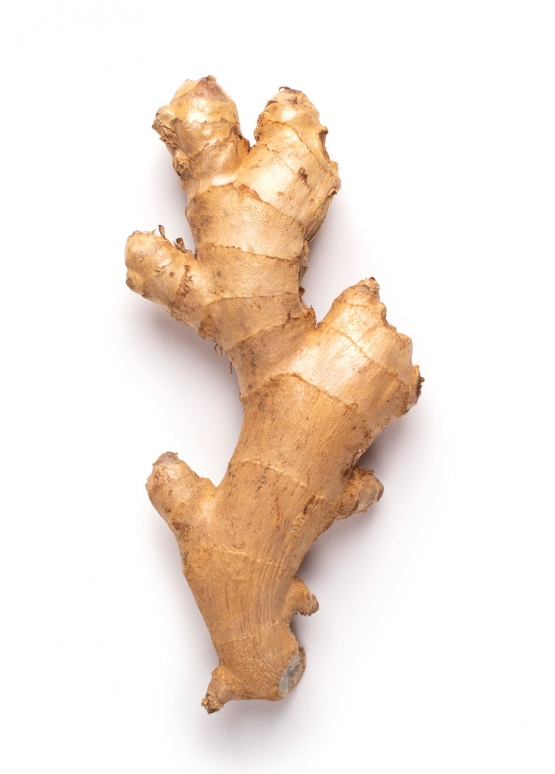
On the other hand, there are foods and habits that can induce the imbalance of intestinal flora, promote inflammation and diminish the efficiency of the immune system if continued over time:
- excessive consumption of sugar, especially refined sugars (sugar, sweets, creams, ice cream, snacks, candies, etc.); refined grains and derivatives; packaged foods prepared with hydrogenated fats and added sugars
- excess of red meat, milk, dairy products, fat
REMEMBER:
- The dietary recommendations given here are not suitable for those suffering from irritable bowel syndrome (IBS) and Crohn's disease
- In case of intestinal discomfort, consult your physician to evaluate the need for possible additional investigations, such as testing for SIBO (small intestinal bacterial overgrowth). This specific test investigates the quantitative and qualitative variation in intestinal bacterial flora occurring in the duodenum, jejunum and ileum.
- choosing foods of organic and/or 0-km origin
- following a varied diet, favoring the consumption of fruits and vegetables, preferably in season, easily digestible proteins (fresh small fish, white meat, eggs), legumes, pumpkin seeds, sunflower, flax, chia, etc., walnuts, almonds, hazelnuts, etc.
- consuming cereals, preferably whole grain but not only, because in some cases fiber prevents the absorption of minerals and other nutrients, semi-wholegrain cereals and pseudocereals (quinoa, buckwheat, amaranth)preferring foods that are sources of omega-3 fatty acids, such as flax oil, hemp oil, oily fish (mackerel, sardines, sardines etc.), chia seeds, flax seeds, etc.
- staying adequately hydrated. Water requirements vary from individual to individual and change according to different lifestyles, the type of activity and the diet. An adult should generally drink 2 liters of water per day for maintaining their health. Water is an essential element for the body because it regulates various biological functions. Therefore, it is important to maintain proper hydration, especially during the summer season, during sports activities and in all situations where a lot of fluids are lost.
- avoiding abuse of gluten-containing foods, packaged foods and fried foods
- limiting sugar, sugary drinks, refined grains (white bread, white pasta, white rice, etc.)
- avoiding hydrogenated fats, limiting red meat, milk and its derivatives, and salt. When consuming them, prefer those of high quality
The notions presented herein are for educational purposes only and cannot under any circumstances replace medical advice. For a complete diet, it is necessary to consult a nutritionist, who, after appropriate clinical and instrumental examination, will be able to identify the needs of the person concerned and put together a personalized diet plan.